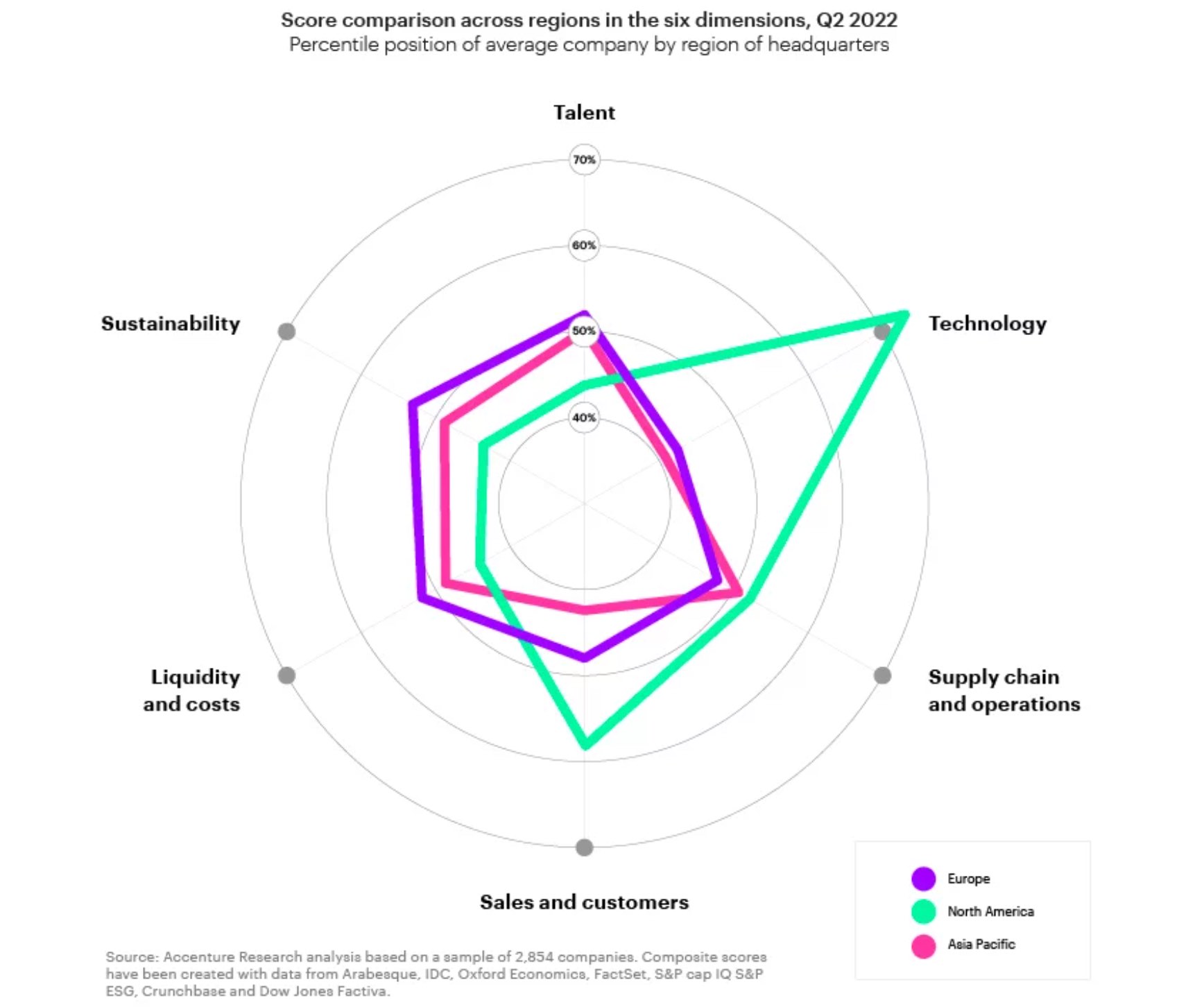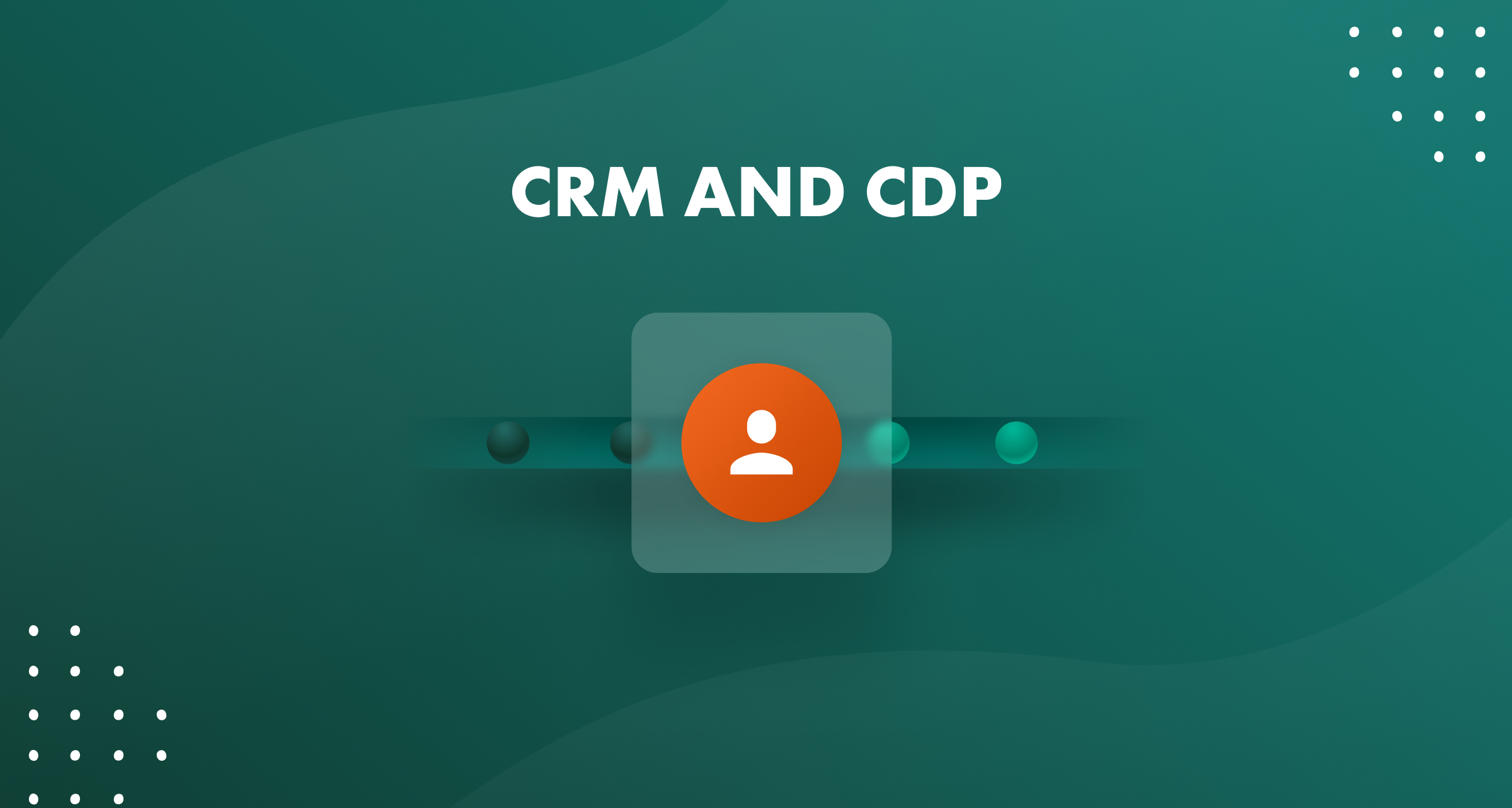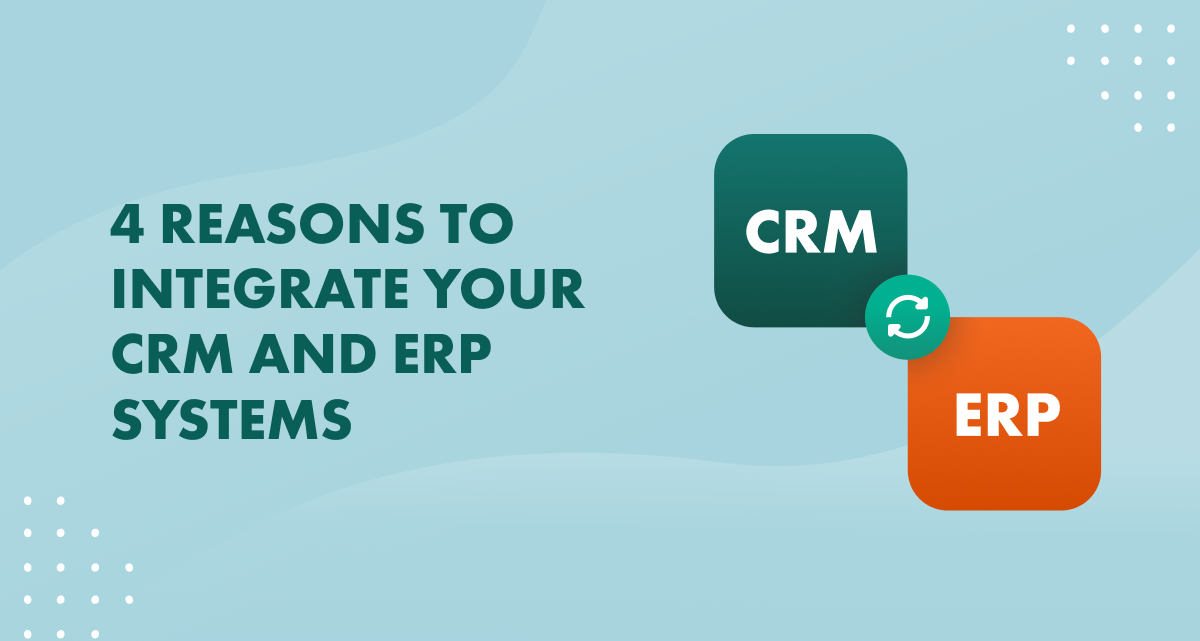Customers expect companies to not only meet, but to exceed their expectations.
CRM software is a technology that can help you do just that.
If you’re a mid-sized company based in Europe, you’re probably debating between US providers and local CRM providers.
In this article, we’ll compare two of the top-rated CRM platforms: SuperOffice and HubSpot.
The European growth challenge
In a survey of 2,000 global companies in Europe, Accenture found that European companies are growing more slowly than those in North America.
The study also compared company performance in these regions across six areas: talent, technology, supply chain and operations, sales and customers, liquidity and costs, and sustainability.

Although Europeans are better at keeping their workforce happy, prioritizing sustainability, and maximizing profit, they’re missing out on the two key ingredients for success:
- The ability to rack up sales and attract loyal customers.
- Using tech advances like data, cloud computing and AI to open up new possibilities.
When it comes to sales and customers, European companies are behind their US counterparts.
Create better customer relationships to build company value
Instead of only gaining more efficiencies, European companies should look at how they can grow new revenue streams.
According to the research, one way to do that is by building strong customer relationships:
- Use both human and machine intelligence to understand your customers better, including their motivations and broader needs.
- Be flexible in meeting changing customer needs. Instead of offering one-size-fits-all products and services, provide personalized solutions.
- Streamline your marketing operations. Make it easier for customers to interact with your brand by integrating customer-facing functions across a single platform.
To achieve this, you need the help of technology and a customer-first mindset.
How CRM software can help you reach your growth ambitions
CRM software supports your CRM strategy, and helps you foster meaningful customer relationships to increase business success.
By focusing on customers and the experience they have with your company, you can better understand their needs and boost loyalty, which leads to increased profits.
Here are a few ways CRM software supports a customer-first business culture:
1. Better knowledge of your customers
A CRM system helps you know your customers on a deeper level.
Track personal info like full names and contact details, as well other important information, such as job titles, language skills and preferences, and especially their business relationship history – all in a central database.
Knowing more about your customers helps you offer a more seamless and holistic customer experience.
2. Better customer engagement
It’s a fact: a customer-first business culture cannot exist in a siloed organization.
A CRM system fosters collaboration between your customer-facing teams – sales, marketing, and service by putting the customer in the center.
With all customer data located in one accessible place, teams can quickly and easily gain deeper insights into customers, empowering them to create more meaningful engagements.
3. Better customer relationships
For any business, the customer is king.
That's why a CRM strategy and CRM system are so important. They help you build strong relationships with your clients over the long haul and increase customer loyalty.
Using the technology and the data in the system, you can respond faster to customers, personalize interactions and make your customers smile.
Let’s look at how SuperOffice and HubSpot compare.
How HubSpot became a CRM platform
In 2005, founders Brian Halligan and Dharmesh Shah had a big mission – to revolutionize the way businesses attract customers.
They saw that the market was shifting and that people were no longer tolerating disruptive ads or sales harassment. Instead, people wanted advice and help.
Thus, HubSpot was born.
Initially an inbound marketing platform, HubSpot has since grown into a $1.7B global US CRM software company targeting companies of all sizes – from single-users to enterprises.
Over the years, HubSpot has become recognized for their marketing software, while continually adding features to their offering:
- Sales Hub: This is sales software designed for sales teams to streamline and optimize sales processes. It includes fully featured sales CRM, sales engagement tools, quote and CPQ functionality, reporting and analytics, and more.
- Service Hub: This is customer service software that helps you deepen customer relationships, connect to the front office, and drive team efficiency. You can get chat tools, a shared inbox, help desk automation, knowledge base functionality, customer feedback and custom surveys, reporting, a customer portal and more.
- Operations Hub: Operations Hub lets you easily sync, clean, and curate customer data, and automate business processes. It includes programmable automation, data sync, data curation, and data quality tools.
Where HubSpot started their CRM software journey in the marketing space, SuperOffice began theirs in sales.
How SuperOffice differs from HubSpot
Founded in 1990, SuperOffice enables mid-sized European companies to build profitable business relationships with their customers.
SuperOffice started as an on-premises CRM platform and is now a 100% cloud-based CRM solution.
Like HubSpot, SuperOffice focuses on the three areas that matter most in a customer-first business culture:

All three customer-facing areas are built on one central CRM platform.
Regardless of which department you’re in, everyone in your company has the same shared view of the customer offering improved collaboration, productivity, and business process support.
But here is where SuperOffice CRM is different:
1. Targets mid-size Northern European businesses
In Europe, a mid-sized company has approximately 50-200 employees.
Mid-sized companies typically have more customer segments, complex workflows and requirements for security, compliance, and support.
SuperOffice CRM pricing plans ensure customers have access to all the features and functionality they need to manage their customer relationships effectively.
2. It’s a globally-minded European company
There’s a difference between “global companies and globally-minded companies,” says Robert Vis, Founder and CEO of communications company, MessageBird. With headquarters in both Amsterdam and San Francisco, he's experienced both sides of the coin.
Vis explains: "Global companies view international expansion like an umbrella – bringing everyone together under a standardized, 'one-size-fits-all' approach. Globally-minded companies don't view international expansion so unilaterally. Instead, they meet customers where they are."
Although 40% of the European Union speaks English, only Ireland has English as a mother tongue.
Unlike the US, Europe consists of diverse cultures and languages.
This is why SuperOffice has 7 wholly owned subsidiaries in Norway, Sweden, Denmark, Germany, Switzerland, Benelux and the UK.
Each office is staffed with local employees who have local knowledge of the market and help customers solve region-specific business challenges.
3. Over 30+ years of CRM experience
With a proven track record of delivering effective solutions, SuperOffice has a deep understanding of what mid-sized European companies need to succeed.
SuperOffice sees CRM as a strategy, rather than just a tool to become more effective.
We strongly believe that an entire company must view, treat, and communicate with customers in one cohesive way.
This experience allows us to provide valuable insights and best practices to help companies achieve new levels of business growth.
SuperOffice CRM or HubSpot? 3 factors to consider
Choosing the right CRM software isn’t black and white.
There are always some shades of gray.
To make sense of the nuances, 95% of customers read online reviews before buying a product.
You, too, have likely visited sites like G2, whose ratings provide an objective take.
We can use these reviews, as well as user feedback, to get the pulse on three key areas: ease of doing business, software usability (ease of use), and quality of support – all which will weigh heavily in your decision-making process!
1. How easy they are to do business with
This score assesses how effective the product has been in supporting its users' business needs.
It considers factors such as the volume and quality of reviews, as well as the overall satisfaction of the reviewers.
When it comes to sales, SuperOffice CRM received a score of 9.3. HubSpot Sales Hub received a score of 8.8.
The following variables are considered factors that positively impact user satisfaction in the CRM software category:
- Contact and account management
- Workflow capability
- Opportunity and pipeline management
For certain users, HubSpot Sales Hub lacks robustness:
“Great for marketing. Not so great for sales. For me, the platform is more geared to marketers. For sales, the report building functionality poses some restrictions, and there is no customization in terms of sales flow and process.” Verified User in Information Technology and Services, Small Business (50 or fewer empl.)
SuperOffice CRM gives you all the functionality you need to do your work, while presenting the information in an easy-to-understand way.
“SuperOffice is one of the most user-friendly CRM-systems I have worked with. You can set up the system in such a way that all necessary sales information can be processed, regardless of the business you are in.” Mark K., Commercial Director (51-1,000 empl.)
2. Software usability and ease of use
Good software design is often the unsung hero of success.
Poorly designed products can be difficult to use, causing users headaches and frustration instead of helping them achieve their objectives quickly and without stress.
A great way to evaluate how user-friendly a product really is by participating in a live demo and/or giving it a test run.
Pay attention to your initial experience. This will give you valuable insights into whether the system has been planned with good usability in mind.
SuperOffice CRM scored 9.1. HubSpot Sales Hub scored 8.7.
The difference lies in the design.
HubSpot Sales Hub offers a lot of features and functions, but the system can be difficult to understand.
“If I had to pick something I disliked about HubSpot, it would have to be the overall layout of the software. There is so much information in one place that it can be overwhelming at first.” Verified User in Human Resources, Mid-market (51-1,000 empl.)
Unlike most CRM software systems, SuperOffice CRM is designed to help users work the way they like to work, without causing confusion or overwhelm.
We put a lot of work into the graphical interface, making entering data effortless. At the same time, users have the freedom to modify the system according to their specific needs.
“A great CRM system adapted to our wishes. Sales and Customer Service organized in one system. ·
- Customer Service can support each other by holidays ·
- Great clear dashboards for tickets and sales
- Many possibilities which we can customize on our own.
- Work efficiently in a user-friendly environment.
- Optimization of the work processes since using SuperOffice
- Great Customer Support
We can easily export our data for customers.” Eveline S., Head of Customer Service E-Delivery, mid-market (51-1,000 empl.)
3. Quality of support
Implementing new software for a mid-sized company can be intimidating, but it doesn't have to be.
Instead of going at it alone, look for a CRM partner who will walk you through each stage of the process.
When researching potential partners, ask yourself:
- How well do they serve their customers?
- What is availability like?
- Do past customers get the right support when issues arise?
The right partnership makes all the difference in achieving success.
When it comes to quality of support:
SuperOffice CRM scored 8.8. HubSpot Sales Hub scored 8.6.
HubSpot offers onboarding resources and support.
Remote onboarding package prices range from $800 to $6,000. The price depends on:
- Your highest priority goals with HubSpot
- The size and complexity of your organization
- The HubSpot products you purchased
- Your current technology stack, and how it integrates with HubSpot
If you require more customization and implementation support, HubSpot offers professional services and 3rd party service providers.
“It's a little pricey for what you get. They are difficult to work with, and require a lot of custom html templates. If you are not familiar with html, then there is another fee to purchase email and web page templates. They also recently reduced the amount of free reports, and you have to sign up for an extra fee to receive all the reports. I don't like the idea of being nickled and dimed every year. The CRM and sales side is super difficult and clunky.” Verified user in Computer & Network Security, Mid-market (51-1,000 empl.)
SuperOffice is committed to being your CRM partner from day one, regardless of the subscription you choose.
You can contact SuperOffice’s expert support team with any questions during office hours or use their emergency line to solve critical issues.
SuperOffice CRM also provides you with:
- Robust CRM Knowledge base
- CRM strategies and video tutorials
- Community forum for developers and technical assistance
“SuperOffice understands our business and what it takes to achieve our goals.” Serge V., Commercial Manager, Enterprise (>1,000 employees)
Which CRM is best for mid-sized European companies?
We often hear from customers that they look for five things from a vendor:
- Someone that understands their business
- CRM advisor
- Local presence
- Training and local support
- Help with implementation
We understand this because we are Europeans ourselves!
What makes CRM software the "best" choice for your company will depend on your company’s unique needs, goals, and preferences.
For some, the best CRM software may be one that is affordable and easy to use, while for others, it may be one that has advanced features and integrations to support complex business processes.
In our opinion, it’s never a good idea to compare solely based on features and functions.
Creating a customer-centric company culture is a combination of selecting the right people, implementing the right processes, and leveraging the right technology to maximize the value of customer relationships.
If you’re not using SuperOffice CRM today, schedule a free demo and we’ll show you how you can use our CRM system and team of experts to improve the quality of your customer relationships.



